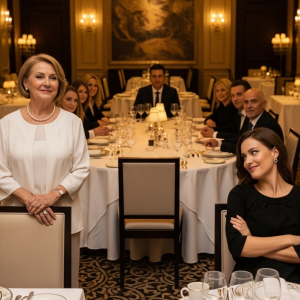My daughter-in-law, Rebecca, laughed when I walked into the wedding alone. But when a stranger arrived minutes later, she froze. I am Vivien Lancaster. It has been a long time since that name meant anything more than a fading headline in an old newspaper. These days, I live quietly on the outskirts of Charleston, my life measured in pots of tea and sunlit mornings.
My son, Jonathan, is a gentle man, so gentle it often borders on weakness. Rebecca is sharp, ambitious, and believes the past is a room that should be kept locked. Only Grace, my granddaughter, is the one light that still tethers me to their world. I chose a life of silence years ago, a quiet retreat from a world that had taken enough. But some invitations are not written in ink; they are written in memory.
When Grace sent me the small, elegant card for her wedding, I knew I had to go. I had to witness the new chapter of the only person who still remembered the old ones. And I knew I had to be remembered in my own way.
I sat in my small kitchen, the invitation resting on a wooden table worn smooth by time. Morning sunlight filtered through the window, falling on Grace’s delicate handwriting. I brewed a pot of English breakfast tea in a white porcelain pot with a fine crack near the spout. It was one of the few things I had left from a time when this house still echoed with laughter.
I picked up the New York Times, my eyes skimming over market updates. Sterling Ventures Group. The name no longer made the bold headlines it once did. I folded the paper and set it aside. I once led Sterling Ventures, a company I built from the ground up. Wall Street had spoken my name with a quiet, grudging respect. But I stepped away. Not because I failed, but because I learned a mother cannot build an empire and hold a family together with the same two hands.
The phone rang. It was Jonathan, his voice soft, almost apologetic. “Hi, Mom. Just a reminder about the wedding.” I listened as he spoke, my eyes drifting to the lavender blooming in my garden. “And please,” he finished awkwardly, “don’t dress up too much.”
Then, another voice, clearer and colder, cut in. It was Rebecca. “Just wear something simple, Mother Lancaster. It’s Grace’s day. We don’t want anyone drawing attention away from her.” Her words were a command disguised as a request.
I knew what she meant. To Rebecca, with her tailored suits and cocktail parties, I was a relic, a shadow from a past she was determined to rewrite. The call ended without a goodbye. Moments later, a text from her appeared: Please remember this is Grace’s day. Don’t draw attention to yourself. No warmth. Just a clinical order. I didn’t respond.
The day of the wedding arrived, wrapped in the soft, warm light of a Charleston evening. I wore a simple, long ash-blue dress and a wide-brimmed hat that shaded my face. I carried an old brown clutch and wore no jewelry. I was a quiet figure designed to blend into the polished noise.
The seaside garden was stunning. Long tables draped in white linen, pastel dresses shimmering in the sun, and the air thick with the scent of roasted meat and vanilla buttercream. I walked down a petal-strewn path, my presence barely registering a flicker of notice.
Rebecca, of course, was the center of it all, a vision in a deep red gown, her jewelry sparkling. She held court, her voice crisp and practiced. “My husband and I are both legal directors at Sterling Ventures Group,” I heard her say. “It’s a family company, you know. We’re proud to continue its long tradition of growth.” Polite nods followed. No one asked who began that tradition.
I found a seat half-hidden behind a cluster of peonies. No one approached me. No one offered me a glass of champagne. The old, hollow feeling settled in my chest, a familiar ache. I sat perfectly still, a ghost at my own granddaughter’s wedding.
A hand touched my shoulder. “Vivien?” The voice was gentle, tinged with surprise. I turned to see Evelyn Brooks, her silver hair pinned back neatly. She was one of the few who remembered. “Oh my, it really is you,” she smiled. “You haven’t changed a bit.”
“Still the same,” I replied with a faint smile. “Just quieter now.”
We sat together, watching the polished spectacle. Across the lawn, Rebecca’s proud voice carried on the breeze. “Even with a volatile market, we’ve preserved the values our family instilled from the very beginning.” I sipped my tea. No one remembered the woman who once commanded silence in boardrooms filled with powerful men.
Then, through the shimmer and the show, a silhouette appeared at the gate. The chatter of the party didn’t just quiet; it fell off a cliff. Conversations dropped mid-sentence. The jazz band in the corner faltered, their notes suddenly sounding out of place.
It was Thomas Sterling. Snow-white hair, a perfectly tailored navy suit, and the old ebony cane that tapped a steady, unhurried rhythm against the stone walkway. He walked as if the world moved only by his permission. Rebecca’s fingers tightened around her wine glass. Jonathan just stared, his face pale. Thomas didn’t greet anyone. He walked straight toward me.
He stopped at my table and gave a slight, formal bow. “Madame Lancaster,” he said, his voice low but clear enough for everyone nearby to hear. “It is good to see you again.” It was a simple greeting, but it echoed like a cannon shot in the silent garden.
“And you as well, Mr. Sterling,” I replied, my voice calm.
Thomas reached into his jacket and pulled out an ivory envelope sealed with red wax. He placed it on the table before me. “What belongs to you,” he said softly, “has always belonged to you.” I didn’t need to open it. Thomas Sterling was not a man who broke his word.
He turned to the crowd, his voice calm but measured. “If I may,” he said, “I’d like to honor an old promise.” The tension was a taut string. Rebecca looked as if she had seen a ghost. And in a way, she had. The ghost of a history she had tried so hard to bury. Sometimes, the past doesn’t return with noise. It simply arrives in a familiar silhouette, and the world forgets how to breathe.
Thomas Sterling stood before the silent crowd, the microphone in his hand. The breeze from the ocean stirred the salty air. “If you’ll allow me,” he began, his voice steady and low, “I’d like to speak for a moment about history. The history of Sterling Ventures Group.”
A nervous ripple went through the guests. Rebecca stood frozen beside Jonathan, her face a mask of disbelief and dawning horror.
“More than forty years ago,” Thomas continued, “before Sterling Ventures even had a name, one person laid the very first brick. It wasn’t me. It was a woman. A woman many of us have forgotten, or worse, never truly knew.”
He let the silence stretch, forcing them to confront their own ignorance. Then, he spoke the truth aloud. “Vivien Lancaster. The founder of Sterling Ventures Group. The woman who built its foundation and steered it through its most uncertain years with quiet, unbreakable resilience.”
The weight of their eyes shifted toward me. No longer dismissive glances, but looks of stunned, hesitant respect. Beside me, Evelyn let out a breath she seemed to have been holding for decades.
Thomas’s voice lowered, but it carried deeper, touching every corner of the silent garden. “Today, it is time those unseen efforts are finally named. It is time history gave her what it should have long ago.” He lowered the mic and extended his hand toward me. “Madame Lancaster, if you would.”
Just then, the MC stepped forward, his voice warm and respectful. “At the request of the bride, we would now like to invite Mrs. Vivien Lancaster, the woman Grace calls her greatest inspiration, to share a few words.”
I stood and walked toward the stage, my simple dress a quiet statement in a sea of finery. I didn’t touch the microphone right away. I let the silence settle, a silence I had known my entire life, but this time, it was mine to command.
My voice, when I spoke, was warm and steady. “Happiness isn’t something we are given,” I said, looking out at the crowd. “It is something we build, with days of kindness and the quiet choice to do what is right.” I turned my gaze to my granddaughter. “I wish for Grace to build her own happiness. Strong, quiet, and enduring.”
That was all. The applause that followed was not loud, but sincere. As I stepped down, Grace ran to me, her arms wrapping around me in a fierce, desperate hug, as if afraid I might vanish again. Evelyn squeezed my arm, her eyes shining. “I always believed in you,” she whispered.
Rebecca stood alone, the crowd that had once surrounded her now gone. She was a striking figure, but adrift. I had reclaimed my story not with anger or revenge, but with the simple, undeniable weight of the truth.
The next morning, I stood on the platform at the Charleston train station. A small suitcase was at my side. Grace was with me, her smile brave through her tears. “Grandma,” she said, handing me a soft, leather-bound notebook. “For you to write down the places you visit. You always dreamed of traveling across the country by train. Now it’s time.”
Across the benches, Rebecca and Jonathan stood watching. Rebecca’s expression was caught somewhere between regret and hesitation. I met her eyes and gave a single, slight nod. No anger, no demand for an apology. Just a quiet acknowledgment. It was enough.
The loudspeaker announced boarding for the New York line. I hugged Grace one last time. “Wishing you a journey to find yourself again,” she whispered.
I didn’t look back as I walked to the train. Onboard, I found my seat by the window. As the train began to move, the world I was leaving behind—the town, the house, the hurt—slipped past. I opened the notebook Grace had given me. On the first page, in her careful handwriting, were her words from the station.
I leaned back, closed my eyes, and let the rhythm of the train carry me forward. I used to believe that love meant sacrifice, that loving others meant quietly enduring. But I had learned that if you do not value yourself, even love can be taken for granted. Sometimes, starting over is the greatest reward for those who are brave enough to leave.
The silence in the car on the way back from the train station was heavier than any argument could ever be. Jonathan drove, his knuckles white on the steering wheel. Rebecca sat perfectly still in the passenger seat, staring out at the blur of oak trees and colonial houses, but seeing none of it. The deep red of her gown felt garish now, a costume from a play that had ended in disaster.
“Did you enjoy the show, Jonathan?” she finally said, her voice dangerously quiet. It was a shard of glass.
“Rebecca, please. She’s my mother,” he murmured, his eyes fixed on the road.
“Your mother,” she repeated, the words dripping with a decade of resentment. “The quiet, harmless little woman from the country. The one who was supposed to sit by the peonies and be grateful for an invitation. Was this your plan all along? To humiliate me in front of everyone we know?”
“It wasn’t a plan!” Jonathan’s voice rose, a rare crack in his gentle facade. “I didn’t even know Thomas Sterling was coming. I haven’t seen him since I was a boy.”
“But she knew,” Rebecca snapped, turning to face him, her eyes blazing. “Don’t be a fool. That frail act is just that—an act. She orchestrated the entire thing. The simple dress, the quiet entrance, the dramatic arrival of her knight in shining armor. She played us. She played me.”
They pulled into the sweeping gravel driveway of their immaculate home. It was a house built on the success of Sterling Ventures, a monument to the very legacy Rebecca had just discovered was a lie. As Jonathan switched off the engine, the silence returned, thick with unspoken accusations.
“Her story doesn’t change who we are,” Jonathan said, trying to salvage something from the wreckage. “We still run the legal department. Our work speaks for itself.”
Rebecca let out a short, bitter laugh. “Our work? We are the son and daughter-in-law of the founder. That’s been our narrative. Our shield. Yesterday, we were heirs to a legacy. Today, we’re the ones who pushed the queen into exile. How do you think the board will see that?” She got out of the car, slamming the door behind her. The sound echoed in the quiet afternoon.
Miles away, the train carved its path northward. I watched the low country marshes give way to sprawling pine forests. The rhythm of the wheels on the track was a soothing lullaby, a sound of forward motion. For the first time in thirty years, I was not running from something; I was moving toward myself.
I took the ivory envelope from my clutch. The red wax seal, stamped with the Sterling family crest, was unbroken. Thomas was a man of immense honor. He had kept his promise, and his silence, for decades. I broke the seal with my thumb.
Inside wasn’t a letter. It was two documents. The first was the original, notarized articles of incorporation for ‘V.L. Investments,’ dated 1978. My name, Vivien Lancaster, was listed as the sole proprietor and founder. The second document was a share certificate. When I had been forced to step away, I’d had to sign over my controlling interest to the Sterling family to secure the company’s future, a silent partnership to prevent its collapse. This certificate, however, was different. It was for a block of shares held in a blind trust by Thomas himself—the foundational shares. Ten percent of the entire company. Shares that, according to the company’s original bylaws which I myself had written, held veto power over any board decision.
He hadn’t just given me back my history. He had given me back my power.
I folded the papers and placed them back in the envelope. The tea I’d ordered arrived, its steam fogging the window. I looked at my reflection—the soft lines around my eyes, the silver in my hair. They were no longer signs of fading away, but marks of survival. The woman who built an empire wasn’t a ghost. She had just been dormant.
Back in Charleston, Rebecca stood in her home office, a sleek, minimalist room of glass and steel. She was scrolling through her phone, her thumb moving frantically. The wedding guests were already posting photos. Most were of Grace and her new husband, but a few blurry shots had captured Thomas Sterling bowing to me. The captions were full of confused whispers and questions. ‘Who was that woman with Thomas Sterling?’ ‘I thought Jonathan’s family started the company?’
Her carefully constructed world was unraveling in real-time.
An email notification popped up on her laptop screen. The sender was Marcus Thorne, the Chairman of the Board for Sterling Ventures Group. The subject line was chillingly simple: Clarification.
Her heart hammered against her ribs. She clicked it open.
Rebecca,
In light of the events at your daughter’s wedding, and a subsequent communication from Thomas Sterling, the board requires an immediate clarification on the founding history of Sterling Ventures Group. There appears to be a significant discrepancy between public record and the information presented by Mr. Sterling. We will be convening an emergency session.
Regards, Marcus Thorne
The screen blurred. A discrepancy. An emergency session. These were the words that ended careers. Jonathan walked into the room, holding his own phone, his face ashen.
“That was Grace,” he said, his voice barely a whisper. “She said Grandma’s lawyer just called her.”
Rebecca looked up, her blood running cold. “Lawyer? What lawyer? She lives on a pension.”
Jonathan swallowed hard, the truth catching in his throat. “Not anymore. The lawyer was just confirming my mother’s new address in New York. They’re preparing for a board meeting. Rebecca… Mom wants to schedule a formal review of the company’s current leadership.”
The last of Rebecca’s composure shattered. The quiet old woman in the ash-blue dress was gone. In her place stood Vivien Lancaster, the founder, the majority shareholder with veto power, and the woman whose future—and whose company—she had so foolishly tried to erase. The ghost hadn’t just returned to the feast; she had come to reclaim the entire house.




